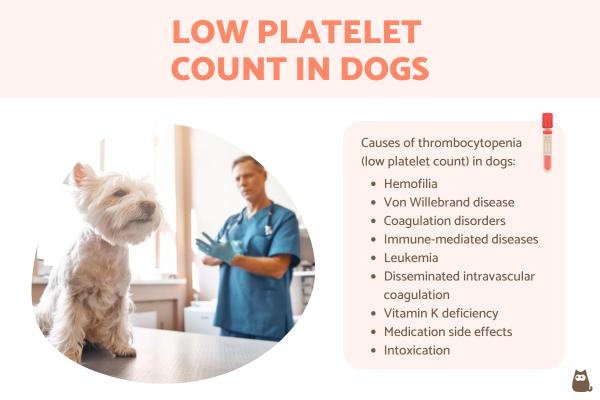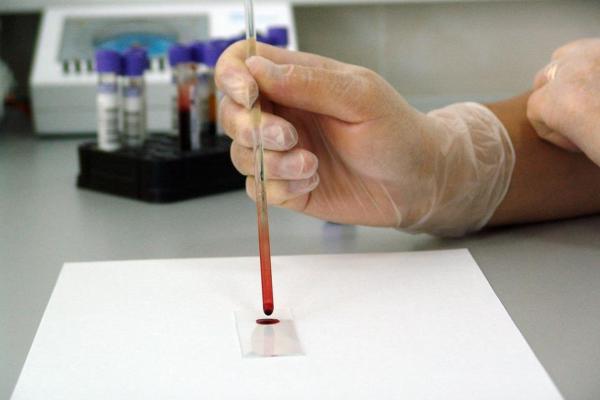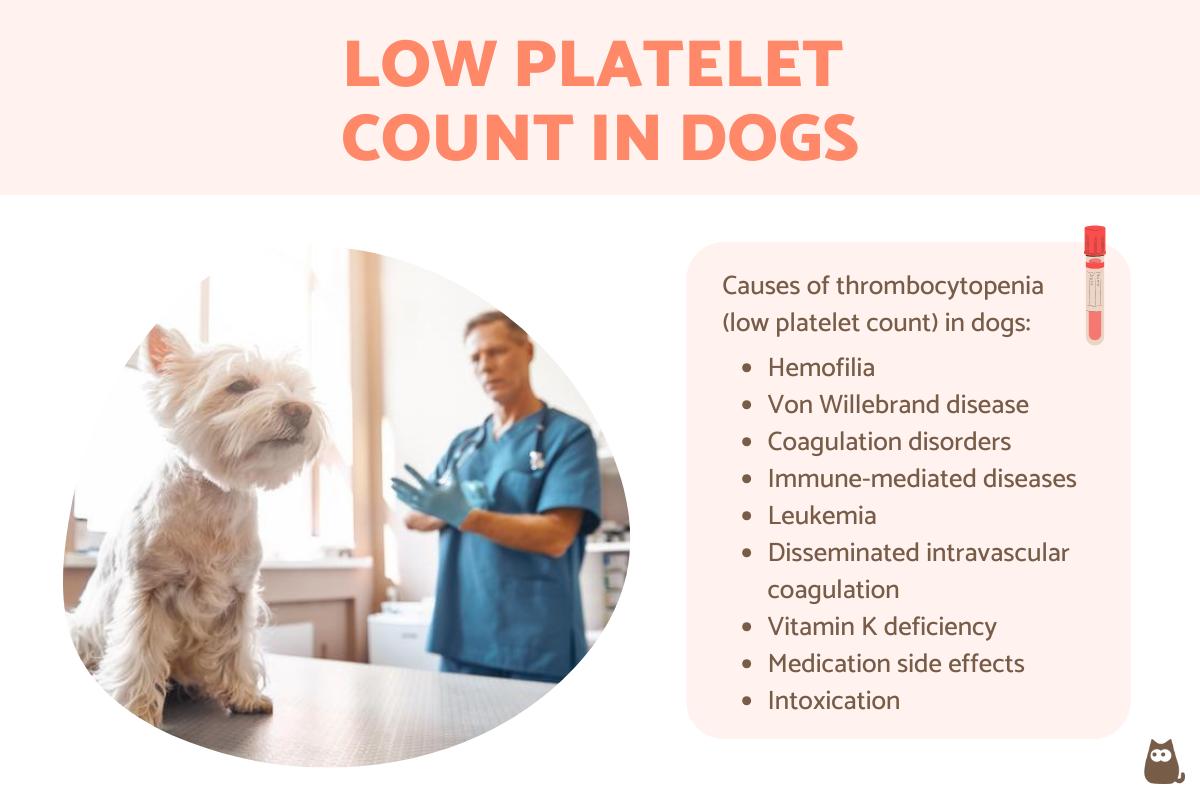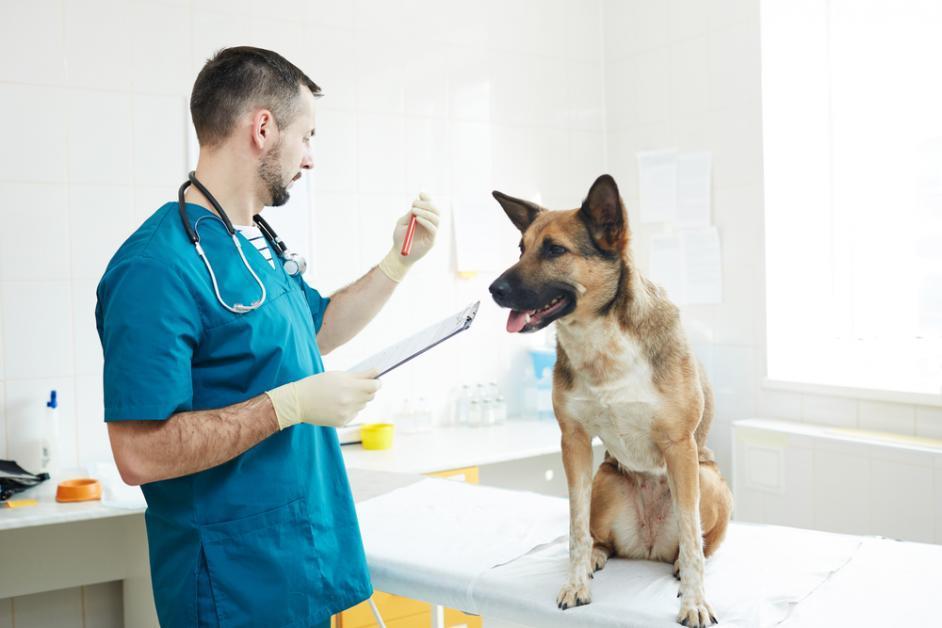Low Platelet Count in Dogs (Thrombocytopenia)



See files for Dogs
Known scientifically as thrombocytopenia in dogs, a low platelet count puts the animal at a significant health risk. Platelets have various functions in a dog's circulatory system, not least of which is their ability to coagulate blood. Doing so helps to bind together leaking blood vessels to stop bleeding. This is necessary for external wounds, but also internal tissue damage. If a dog has low platelets, they can hemorrhage significantly and greatly increase the possibility of death, even from relatively minor wounds. To measure a dog's platelet count, the veterinarian will need to carry out a blood test.
At AnimalWised, we discover the causes, symptoms and treatment of a low platelet count in dogs, otherwise known as thrombocytopenia. We look at the related conditions which can result in a low platelet count, as well as how we might be able to raise their levels.
Thrombocytopenia in dogs
Also known as a low platelet count in dogs, thrombocytopenia is a hematological condition where the number of platelets in a dog's blood is below the normal range for dogs. A dog's platelet count will differ for various reasons and individual dogs may have reasons for specific variations. However, there is a range within which every dog needs to be in order to allow proper functioning of their organism.
Thrombocytopenia is a symptom of other conditions, rather than a disease in itself. However, it is a medical condition which can cause other responses in the dog which result in concurrent symptoms which may not be directly related to the underlying cause of thrombocytopenia in dogs.
When a dog's platelets are sufficiently low, their body will start to malfunction. While a patient may have lower than the normal platelet count in dogs, they may not be in immediate danger. Once it reaches a certain lower limit, it will be considered a veterinary emergency. One of the main ramifications is the inability to coagulate blood properly. This can cause internal bleeding which can result in shock and even death[1].
What is a normal platelet count in dogs?
A dog’s platelet count is determined by extracting and analyzing a blood sample. If your dog has a high or low platelet count, a veterinarian will have to diagnose the cause. Thrombocytopenia in dogs causes may be a result of insufficient platelet production, platelet destruction or excessive consumption. Often, thrombocytopenia symptoms only occur in more severe cases.
A high platelet count in dogs could cause blood clots known as thrombi a condition related to thrombocytosis. These clots can clog vessels and arteries, resulting in the death of the animal. This is caused by improper functioning of bone marrow cells, but it is a is very rare in dogs.
Normal platelet counts in dogs are between 175,000 - 500,000 per microliter of blood. When the blood reaches 30,000 platelets per microliter of blood or lower, it is considered a veterinary emergency. However, prolonged low platelet counts are also deleterious to a dog's health.
As we have stated, a dog's platelet count is measured by a blood test. For more, we recommend reading our article where we discuss how to understand a dog’s blood test.

Symptoms of low platelet count in dogs
The most common symptoms of low platelets in dogs are hemorrhages. Hemorrhages occur when a dog suffers from a wound which does not stop bleeding. The lack of platelets prevents the blood from clotting and even minor wounds can bleed profusely. Other thrombocytopenia in dogs symptoms include:
- Excessive bruising
- Bleeding from the nose and/or mucous membranes
- Apparent blood in dog’s mouth
- Petechiae (hairless patches inside the ears, mouth or on the belly)
- Blood in dog’s stool
- The dog urinating blood
Thrombocytopenia can affect dogs of any age and can be caused by a hereditary disease or by an acquired medical condition. When we see an external wound that won't stop bleeding, it will be a clear sign that the dog needs to see a veterinarian. However, internal injuries or diseases exacerbated by thrombocytopenia have symptoms which are less obvious.
Symptoms such as blood in the dog's feces or the dog peeing a little blood can alert us to a dog's low platelet count, but it is important to know these are symptoms of various disorders. Depending on the source of the bleeding, the blood will appear lighter or darker. It is vital we take a dog to the veterinarian when we see these symptoms, especially since the causes are so varied.
Causes of low platelet count in dogs
There are various medical conditions and diseases associated with thrombocytopenia in dogs. As we have stated, a low platelet count is a symptom and not a disease in itself. With this in mind, the most common causes of low platelets in dogs include:
- Hemophilia: a hereditary disease that causes coagulation alteration. This disease usually only manifests itself in male dogs because it is genetically very rare for a female to inherit the hemofilia gene. This is because it is an x-linked recessive disorder and a female will need both parents to have the gene. For this reason, affected animals should not reproduce. Learn more about why blood is coming out of my dog’s nose?
- Von Willebrand disease (VWD): a genetic disorder which results in the absence of the necessary clotting protein, von Willebram factor (VWF). Doberman Pinschers are a breed of dog with the highest incidence of vWD, however, it can affect dogs of all breeds. For more, we recommend taking a look at our article where we list the most common illnesses in Dobermans.
- Coagulation disorders: in addition to the aforementioned pathologies, there are various coagulation or clotting related problems which are hereditary in dogs.
- Immune-mediated pathologies: in these such cases, a dog's own immune system attacks and destroys its own platelets. These pathologies are usually idiopathic, meaning they are of unknown origin.
- Leukemia: this cancer type is incredibly serious and affects the components of a dog’s blood. For example, low white blood cells and low platelet count occurs in affected dogs. In addition erythrocytes, eosinophils, etc. can also be diminished. Additional leukemia in dogs symptoms include fever, anorexia and or anemia. To learn more about this potentially fatal condition, we suggest reading our guide to leukemia in dogs.
- Disseminated intravascular coagulation (DIC): is an acquired hemorrhagic disorder that is triggered by serious causes such as tumors, infections or severe heat stroke. This condition forms blood clots throughout the body thereby blocking small blood vessels, triggering hemorrhaging. This condition is incredibly severe and can result in the death of the animal affected.
- Vitamin K deficiency: is another acquired disorder that is usually related to poisoning by products such as rodenticides. The prognosis will depend on the severity of the poisoning. For more, find out everything you need to know about dog poisoning here.
- Medication side effects: certain medications may cause a low platelet count as a side effect. This is the case with certain antibiotics, ACE inhibitors, phenobarbital and even estrogen. It is also a common side effect of chemotherapy in dogs with cancer, so careful monitoring of platelets is carried out during treatment of this disease.
- Intoxication: if a dog has ingested a toxic compound or other poisonous substance, it can lower the platelets and send the dog into shock.
It’s also important to know that there are some drugs on the market that can decrease a dog platelet count. Keep reading to find out how to increase platelet count in dogs.
Diagnosis of thrombocytopenia in dogs
Since it is a condition defined by a low platelet count, treatment of thrombocytopenia in dogs requires raising the count to within the healthy range. To do so, the first thing we will need to do is to determine the low count. This will be carried out by the veterinarian at a clinic through a blood test. It is not something we can do at home.
The blood test required to diagnose thrombocytopenia in dogs is known as a complete blood count (CBC). This directly measures the number of platelets, as well as other important factors. A blood smear will then be used to visually confirm the platelets, followed by a determination of the mean platelet volume (MPV).
Once the low platelet count has been determined, further tests will need to be carried out by the veterinarian. Some of these may be determined by the CBC, but other tests will also be required. For example, imaging tests may be used to determine the presence of tumors or other conditions.
How to increase blood count in dogs
When it comes to low platelet count in dog treatment, the first thing you need to do is distinguish its cause. This will require a differential diagnosis by a trusted veterinary professional as detailed in the section above. The aim of treatment is to raise the dog's platelets, but stabilization of the dog's symptoms and treatment of the underlying condition are also essential.
If we have taken our dog to a veterinarian because of a hemorrhage, this will need to be contained. This may require the use of blood clotting drugs, but surgery may also be required in some cases. A blood transfusion will also be necessary if they have lose a sufficient amount of blood. If the the platelets have been destructed due to an immune system related condition, corticosteroids may also be prescribed. The rest of the treatment will depend on the cause of your dog’s thrombocytopenia:
- Hemofilia: blood transfusions may be used to increase clotting factors, but most common is the use of drugs such as desmopressin to increase the VWF, as well as tranexamic acid to increase clotting.
- Von Willebrand disease in dogs: a similar treatment to hemofilia is carried out, but hormone therapy may also be useful in female dogs.
- Coagulation disorders: often the use of coagulant drugs is required, but it will depend on the disorder.
- Leukemia: some combination of supportive treatment, along with chemotherapy to kill the cancer cells. Blood marrow transplant may also be used.
- Disseminated intravascular coagulation: supportive therapy and the use of anticoagulant drugs. Surgery may be required in the case of organ failure.
- Vitamin K deficiency: diet and supplements to increase vitamin K levels.
- Medication side effects: cessation of treatment, supportive therapy and starting a new treatment.
- Intoxication: the dog will need to be stabilized and supportive treatment such as fluid therapy is required.
How to increase dog platelet count in dogs
You can favor a dog’s recovery (under the supervision of a veterinarian) by:
- Offering your dog soft food which will avoid accidental gum bleeding.
- Offer your dog an opportunity to rest and recover well by decreasing its exercise intensity.
- Remove any items from your dog’s environment to avoid injury.
For more, we recommend reading our article where we discuss everything you need to know about normal vital signs in dogs.

Home remedies to increase platelets in dogs
There is no diet that will directly treat thrombocytopenia in dogs. However, providing a balanced diet and a proper exercise routine can ensure the dog has a strong immune system and is able to protect themselves against some of the causes of thrombocytopenia. Ensuring their diet has the right levels of nutrients such as vitamin K, folate and vitamin B12 will be best for all dogs, but especially those with low platelet counts.
Diseases and medical conditions which cause thrombocytopenia are serious and cannot be treated using home remedies. We need to take them to a veterinarian to determine the cause and provide the range of treatments required. If we do not take them for clinical treatment, hemorrhaging can result in the death of the dog. So too can a lack of treatment of the underlying cause.
Learn more about what is entailed in a healthy diet for dogs in our related guide.
This article is purely informative. AnimalWised does not have the authority to prescribe any veterinary treatment or create a diagnosis. We invite you to take your pet to the veterinarian if they are suffering from any condition or pain.
If you want to read similar articles to Low Platelet Count in Dogs (Thrombocytopenia), we recommend you visit our Other health problems category.
1. Schwartz, D., Sharkey, L., Armstrong, P. J., Knudson, C., & Kelley, J. (2014). Platelet volume and plateletcrit in dogs with presumed primary immune-mediated thrombocytopenia. Journal of veterinary internal medicine, 28(5), 1575–1579.
https://doi.org/10.1111/jvim.12405








